
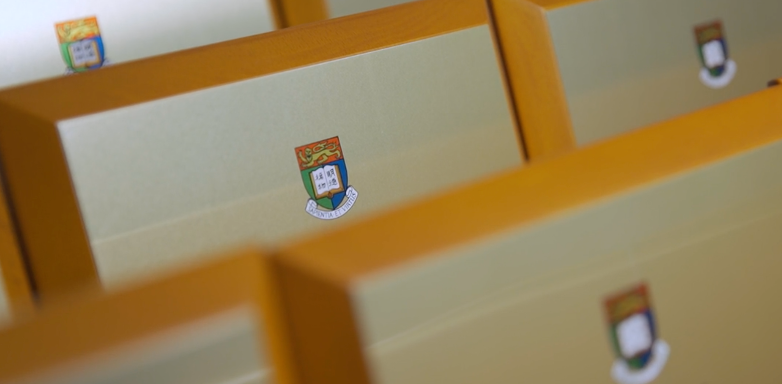
{{'Newsletter' | t}}
Student Research Highlights
The University works extensively in promoting and expanding opportunities for students to engage in research activities to strengthen their research capability and gain hands-on experience. In this issue, we are proud to introduce some of the high-quality work of our research postgraduate students, whose work shines across multiple disciplines in the international arena and local community.
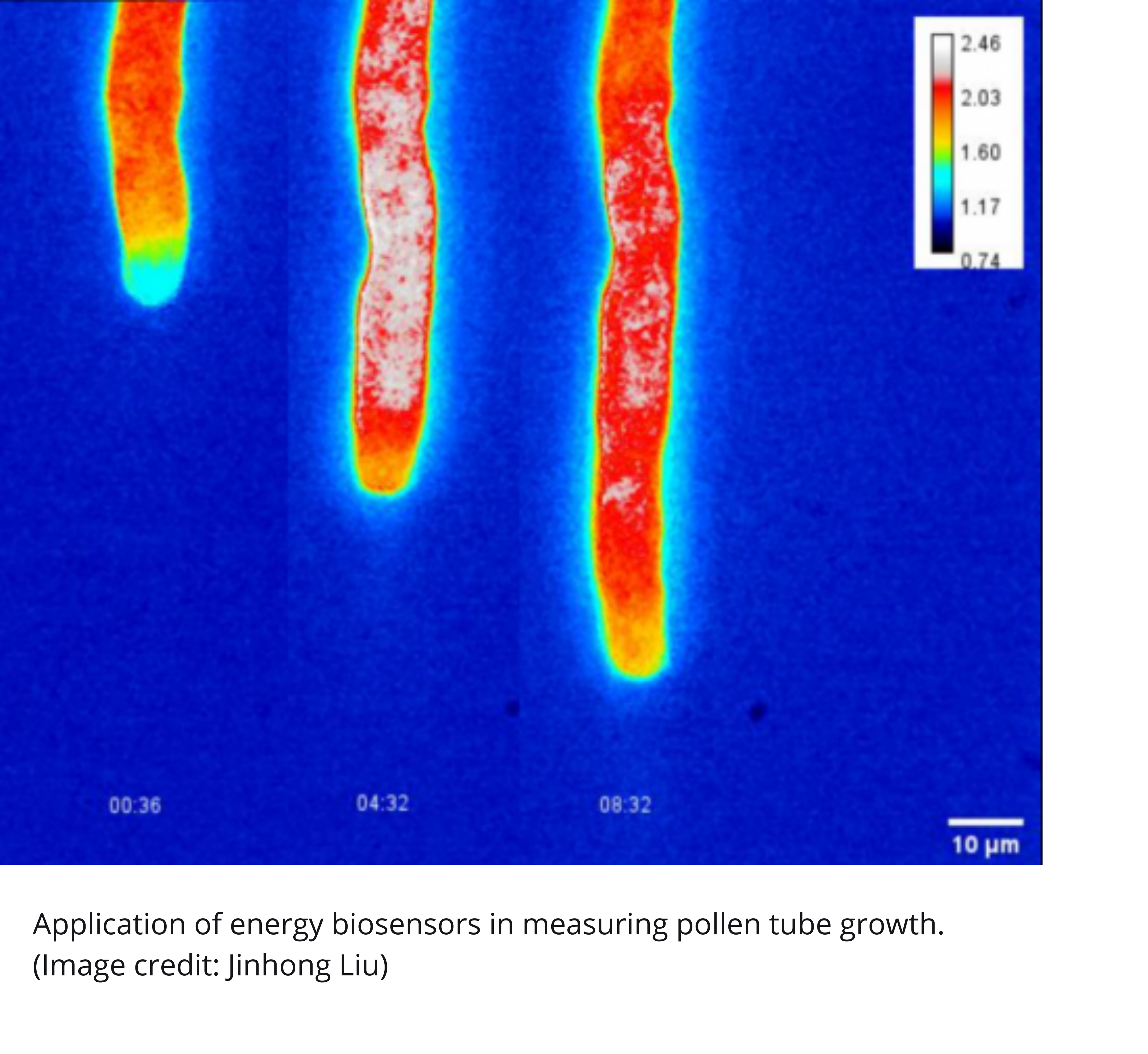 PhD Student Jinhong Liu and Supervisor Dr Boon Leung Lim Discover Energetics behind Pollen Tube Growth
PhD Student Jinhong Liu and Supervisor Dr Boon Leung Lim Discover Energetics behind Pollen Tube Growth
PhD student Jinhong Liu joined a research team led by Dr Boon Leong Lim of the School of Biological Sciences and developed practical biosensors to measure the real-time dynamic changes of energy currency in living plant cells and organelles. The work reveals how Arabidopsis pollen tubes gain energy to sustain their rapid growth.
The team developed second-generation fluorescence nicotinamide-adenine dinucleotide phosphate (NADPH) and nicotinamide adenine dinucleotide (NADH)/NAD+ ratio protein sensors and introduced these biosensors to the plastids and the cytosol of Arabidopsis pollen tubes, thereby revealing the bioenergetics of pollen tube growth. This research not only developed more practical biosensors to measure real-time dynamic changes of adenosine triphosphate (ATP), NADPH, and NADH/NAD+ in living plant cells and organelles, but also revealed the exact biochemical routes of supplying ATP, NADPH, NADH, and acetyl-CoA for fatty acid synthesis in pollen plastids. The findings have been published in Nature Communications in a paper titled “Bioenergetics of pollen tube growth in Arabidopsis thaliana revealed by ratiometric genetically encoded biosensors”.
Ms Liu, the first author of the article and a PhD student of Lim’s group, remarked, “The in planta fluorescence protein sensors we developed are powerful tools for solving some key questions in plant bioenergetics. We are happy to publish two manuscripts in Nature Communications in 2022 on our discoveries using this novel technology”. Please click here for more information.
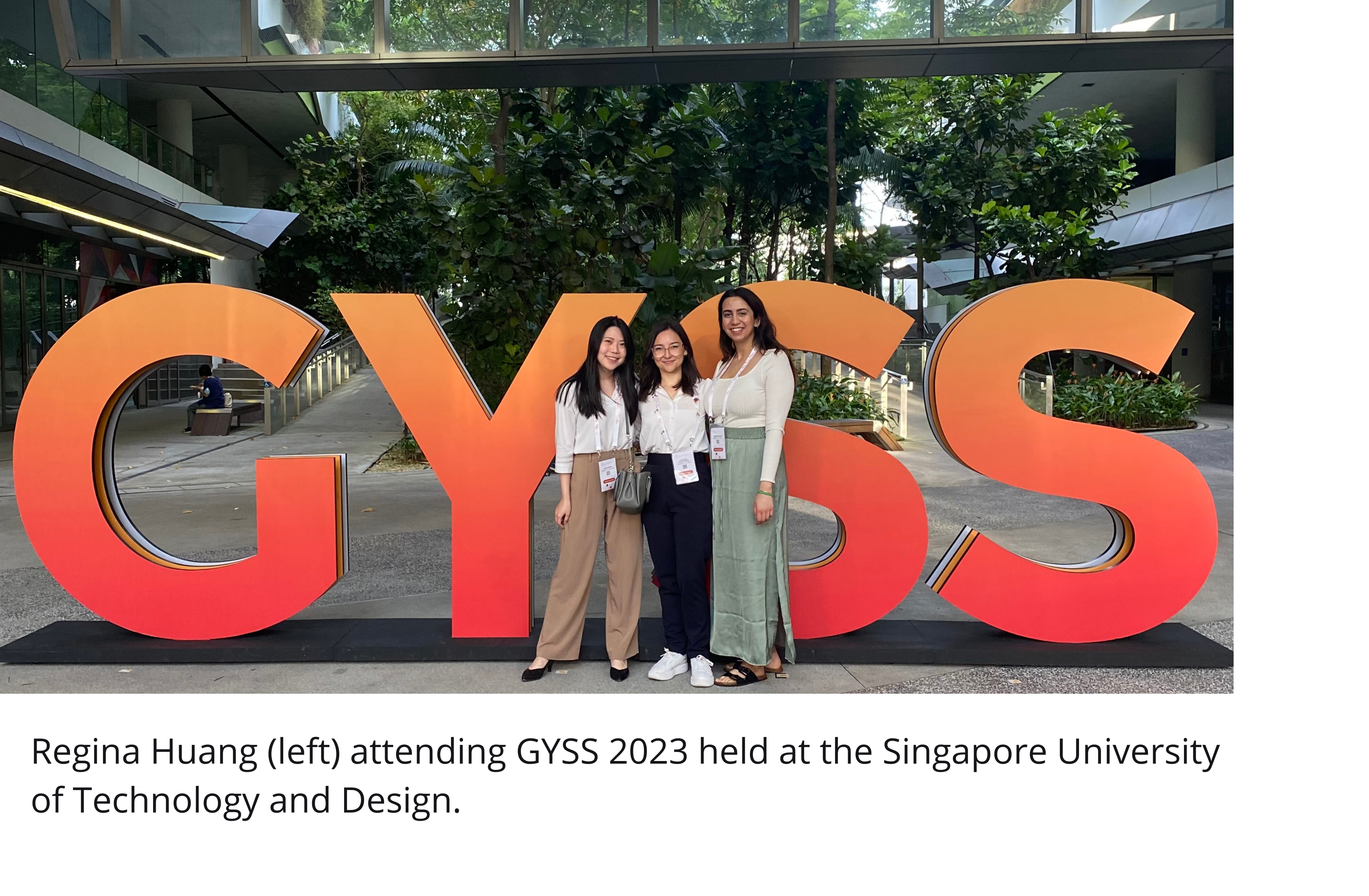 Rapid Synthesis of Bismuth-Organic Frameworks as Selective Antimicrobial Materials against Microbial Biofilms
Rapid Synthesis of Bismuth-Organic Frameworks as Selective Antimicrobial Materials against Microbial Biofilms
Regina Huang, a third-year PhD student in Periodontology and Implant, was selected as an on-site participant at the 11th edition of the Global Young Scientists Summit (GYSS) that took place on 17–20 January 2023 in Singapore. The summit unites some of the brightest minds in science and technology, including recipients of prestigious awards such as the Nobel Prize, Millennium Technology Prize, Fields Medal, and Turing Award.
During session breaks, Ms Huang’s recent publication in Materials Today Bio, titled “Rapid synthesis of bismuth-organic frameworks as selective antimicrobial materials against microbial biofilms”, generated much interest from other young scientists. She also received valuable insights into various career pathways available to scientists from Dr John Mather (2006 Nobel Prize in Physics), Dr Lihan Zhou (CEO of MiRXES), Dr Xu Shi (Founder of Nanofilms), and Dr Lim Jui (CEO of SGInnovate) in the panel discussion session.
 Fly south – Fly north: The Oriental White Stork's Journey to the Wetlands
Fly south – Fly north: The Oriental White Stork's Journey to the Wetlands
Ting Wang, a PhD candidate in Architecture, has launched a book titled Fly south – Fly north: The Oriental White Stork's Journey to the Wetlands, published by China Forestry Publishing House, a leading Chinese publisher in the field of nature conservation.
This book provides a new perspective on nature by combining science and humanities and the arts in collaged drawings. Readers are encouraged to use their own imagination to discover the key elements of the landscape and become aware of the hidden connections between species, between species and their environment, and between human and non-human species. Click here for more information.
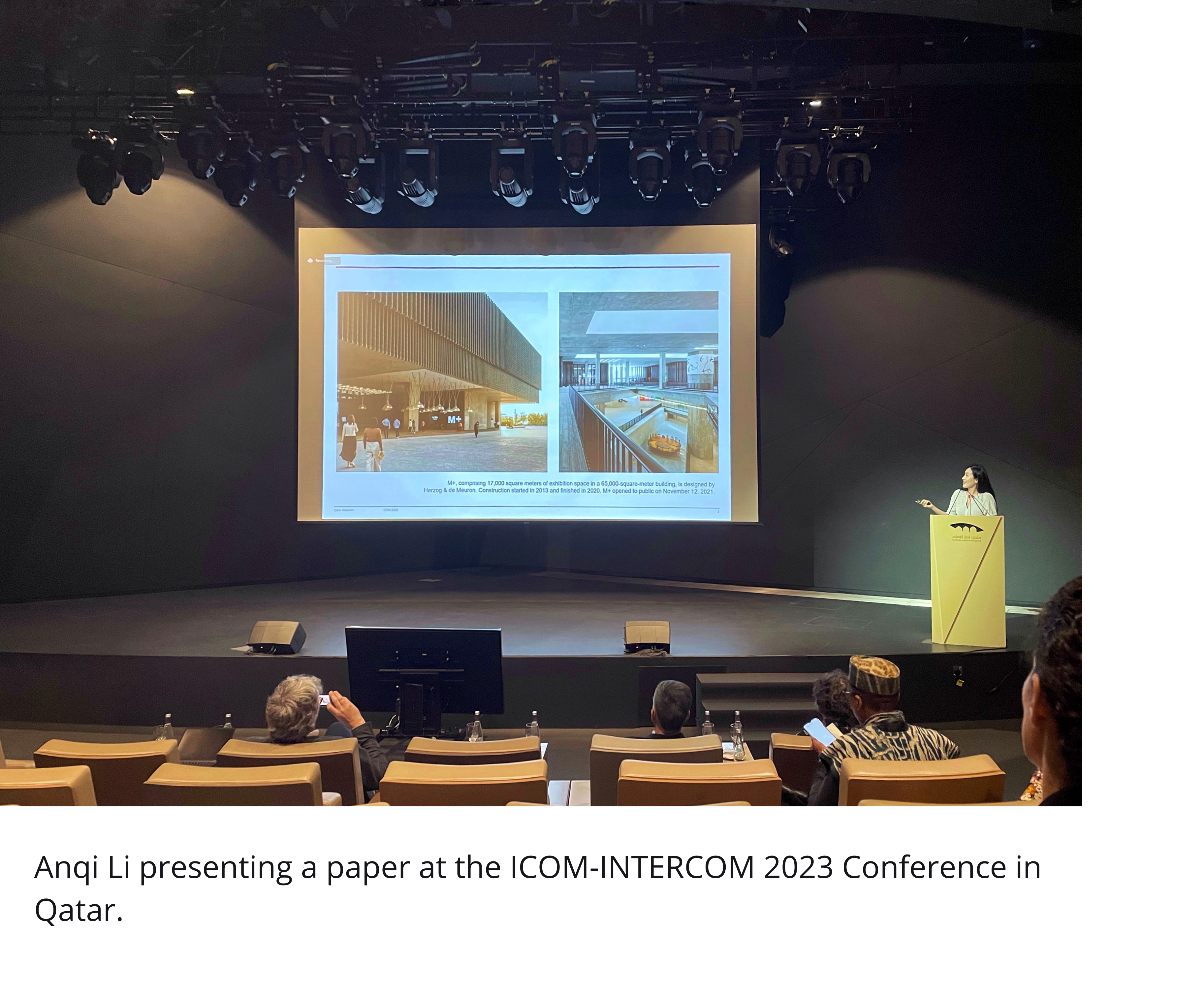 Sustaining Art Museums: A Study of Corporate Governance of M+
Sustaining Art Museums: A Study of Corporate Governance of M+
Anqi Li, a PhD candidate from the School of Modern Languages and Cultures, presented a paper at “The Future Museum. Framing the Skills and Mindsets of the Visionary Leader Conference" organised by ICOM-INTERCOM in partnership with Qatar Museums on 7–9 May 2023.
In this paper, Ms Li investigated the case of M+ from the perspectives of critical studies of cultural policy, neoliberalism, and bureaucracy in order to understand the cultural, economic, and political logic of art museums in the 21st century. She conducted a historiography of making M+ to understand the issues around its governance and leadership today, and conducted a series of interviews with stakeholders to illustrate internal and public criticism. This paper aims to contribute to the research of contemporary museums studies and the construction of a series of new policies and guidance for arts non-profit organisations.
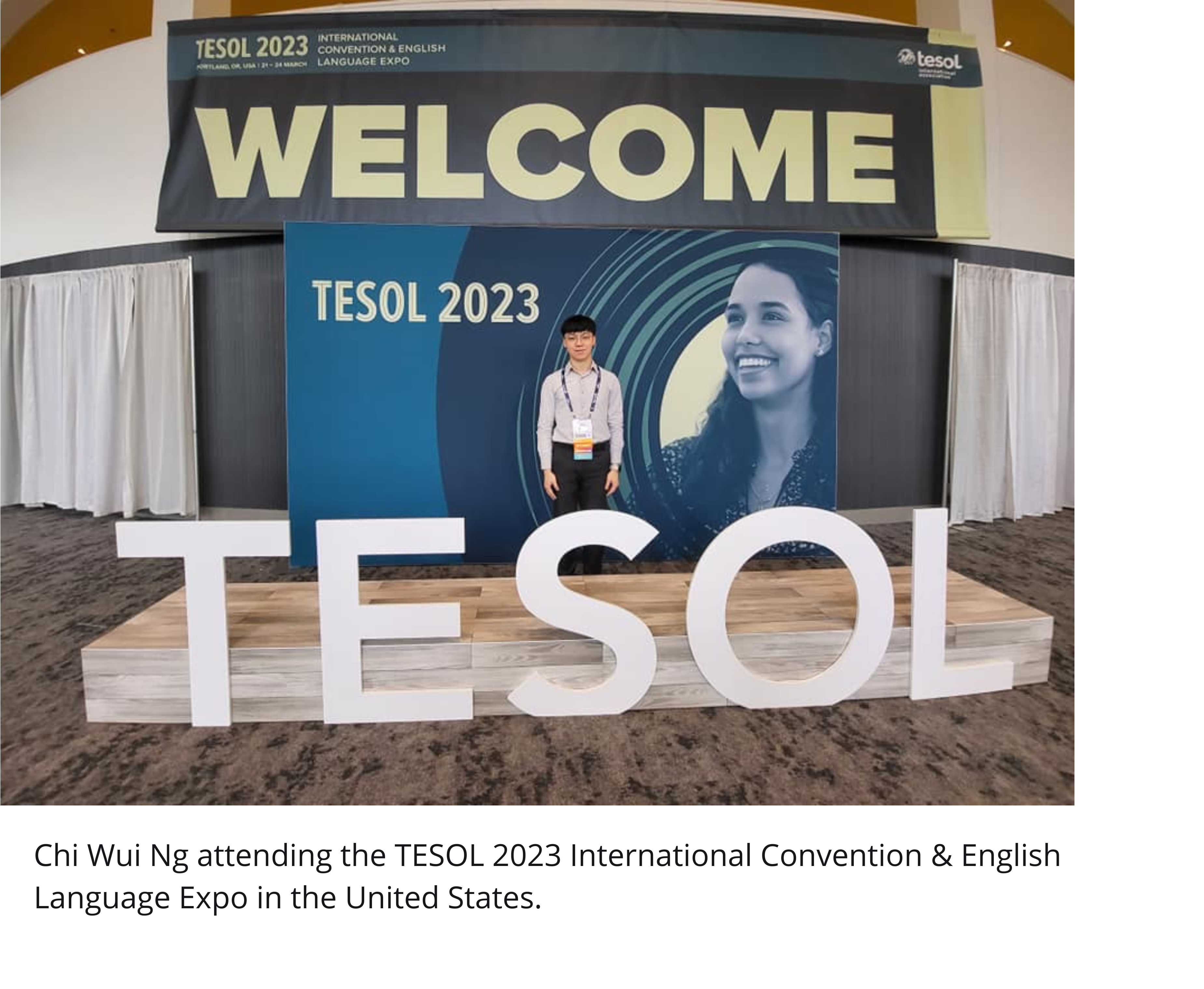 Instruction on Tenses through Systemic Theoretical Instruction and Cognitive Grammar
Instruction on Tenses through Systemic Theoretical Instruction and Cognitive Grammar
Chi Wui Ng, a PhD candidate from the Academic Unit of Social Contexts and Policies of Education, presented a paper at the TESOL 2023 International Convention & English Language Expo in Oregon, USA in March. His study investigates the application of systemic theoretical instruction and cognitive grammar to instruction on the English tense system in a secondary classroom. Impacts of the pedagogical approach on students’ grammatical performance and conceptual development of the English tense system as well as students’ perceptions of the learning experience are examined.
“As a (former) English language educator, having attended 36 sessions in total, I was able to review my pedagogical content knowledge, reflect on my own pedagogical practice, and reformulate my own pedagogical beliefs,” shares Mr Ng. “Some recurrent themes discussed in the convention were multiculturalism, linguistic discrimination, inequality, privilege, marginalisation, and social justice. Distant as they seem, these issues are indeed highly relevant to the local context.”
Predicting Oral Cancer Risk Using Machine Learning
PhD student John Adeoye from the Division of Oral and Maxillofacial Surgery participated in an interdisciplinary research study led by Professor Richard Su to construct two supervised AI-based models to predict malignant transformation in oral leukoplakia/oral lichenoid mucositis. They were found to be more sensitive and accurate than the current method of risk prediction in these patients.
The AI (new) method proposed in the research outperformed the current method for predicting oral cancer risk in patients with the conditions mentioned, and the research team believes this method can better help clinicians and patients in treatment planning for more effective prevention and early detection of oral cancer. The findings have been published in the Journal of Big Data.
Water Charge Transfer Accelerates Criegee Intermediate Reaction with H2O– Radical Anion at the Aqueous Interface
Qiujiang Liang, a fourth-year PhD student in the Department of Chemistry, has published an article in the Journal of the American Chemical Society as the first author.
Criegee intermediates (CIs) are important carbonyl oxides that may react with atmospheric trace chemicals and impact the global climate. The CI reaction with water has been widely studied and is a main channel for trapping CIs in the troposphere. Previous experimental and computational reports have largely focused on reaction kinetic processes in various CI–water reactions. This work provides insights into what may alter the oxidizing power of the troposphere by the next larger CIs than simple CH2OO and implicates a new perspective on the role of interfacial water charge transfer in accelerating molecular reactions at aqueous interfaces.
Multimodal Dynamic and Unclonable Anti-Counterfeiting Using Robust Diamond Microparticles on Heterogeneous Substrate
PhD student Tongtong Zhang from the Department of Electrical and Electronic Engineering has had his first-author paper published in Nature Communications investigating the growing global problem of counterfeiting.
In this study the research team reports multimodal, dynamic, and unclonable anti-counterfeiting labels based on diamond microparticles containing silicon-vacancy centres. These chaotic microparticles are heterogeneously grown on silicon substrate by chemical vapour deposition, facilitating low-cost scalable fabrication. The intrinsically unclonable functions are introduced by the randomised features of each particle. The highly stable signals of photoluminescence from silicon-vacancy centres and light scattering from diamond microparticles can enable high-capacity optical encoding. The proposed system can be practically applied immediately as anti-counterfeiting labels in diverse fields.
RIF1 Suppresses the Formation of Single-Stranded Ultrafine Anaphase Bridges via Protein Phosphatase 1
Nannan Kong, a PhD student in Dr Ying Wai Chan’s Lab in the School of Biological Science, has published a paper on RIF1 (Rap1-interacting-factor-1) in Cell Reports as the first author.
To understand the role of RIF1 in resolving DNA bridges, Ms Kong and the team employed a revolutionary genome editing technology, the CRISPR/Cas9, to deplete RIF1 in a cell model during mitosis. The team found that loss of RIF1 leads to increased formation of DNA damage and micronuclei due to the breakage of ultrafine DNA bridges, as the data suggest that RIF1 plays a crucial role in preventing double-stranded DNA bridges from converting into single-stranded DNA, which is more susceptible to breakage.
This research not only sheds light on the novel regulatory mechanism by which RIF1-PP1 facilitates the resolution of DNA bridges, but also reveals how ultrafine DNA bridges can induce DNA damage and genome instability if they are not properly resolved. The findings suggest that DNA bridge-binding proteins may serve as potential therapeutic targets for developing anticancer drugs, as DNA bridges are considered a source of genome instability that drives tumorigenesis.
Shareholders’ Panacea: Overcoming Reflective Loss through Treaty Arbitration
Prakritee Yonzon, a PhD candidate from the Faculty of Law, has published an article in the Journal of the Law of Society of Hong Kong titled “Shareholders’ panacea: Overcoming reflective loss through treaty arbitration”.
Since recovery of shareholders’ losses are restricted in commercial corporate law, through the reflective loss principle, this article discusses potential remedies shareholders may have in investment treaty arbitration.
By discussing the evolution of case law in common law, particularly the UK and Hong Kong, the writers reflect on the reasoning behind the policy considerations of the reflective loss principle. On the other hand, case laws of Investor State Dispute Settlement show the stark approach taken by treaty tribunals in allowing shareholders to claim losses for wrongs inflicted on their companies. Although there are arguments that this mechanism is designed to protect investors, the writers argue that the investment treaty mechanism remains a valid alternative to shareholders with outbound investment in high sovereign risk jurisdictions.

From Establishment to Clinical Applications of the Hong Kong Neuromuscular Disorder Patient Registry: An Influential Research Platform
Michael Kwan Leung Yu, PhD candidate in the Department of Paediatrics and Adolescent Medicine, participated in the Joint Annual Scientific Meeting 2022 (JASM2022) in Hong Kong and the TREAT-NMD Conference 2022 at the Vancouver Convention Centre, and received 2nd prize for the best oral presentation in JASM2022 and accreditation from the global TREAT-NMD registries alliance.
“I had the honour of presenting two posters, one about our research on COVID-19 vaccines in paediatric patients with neuromuscular disorders (NMDs) and the other about the HK NMD patient registry establishment. I also gave an oral presentation on our phenotypic-genotypic correlation study in our patients with FSHD, a subtype of NMD, and the adoption of artificial intelligence on facial weakness recognition,” Mr Yu said. “These conferences provided me with an invaluable opportunity to share my research projects on NMDs, a group of rare and highly heterogeneous disorders with primary pathology in the peripheral nervous system.”
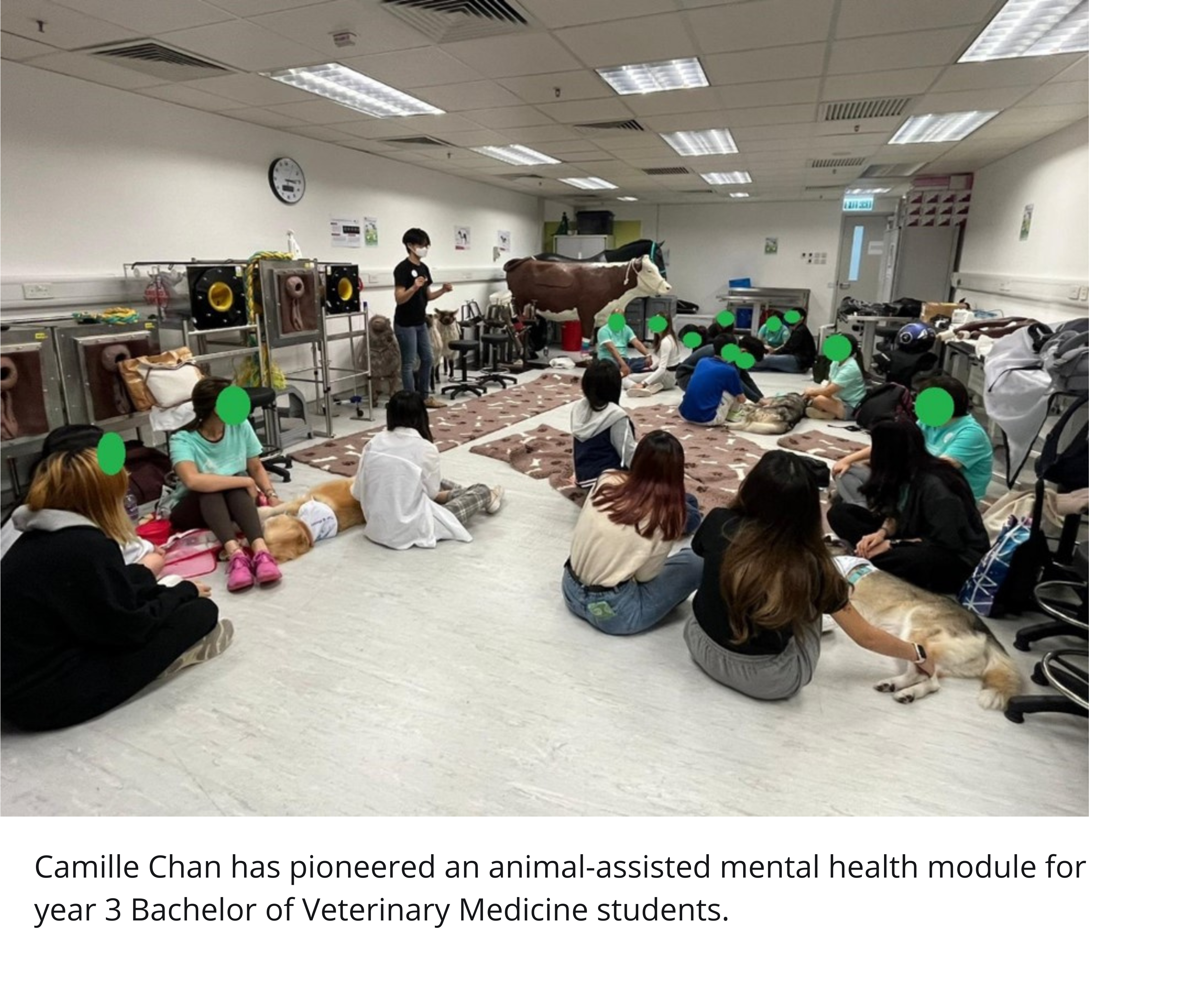 A Study on the Mental Health Landscape of Practising Veterinarians
A Study on the Mental Health Landscape of Practising Veterinarians
PhD candidate Camille Chan in the Department of Social Work and Social Administration has pioneered an animal-assisted mental health module that is embedded into the veterinary curriculum of the Hong Kong Vet School.
The six sessions piloted for year 3 Bachelor of Veterinary Medicine students intended to improve their mental health literacy, covering topics on mental health stigma, the veterinarian identity, relationship building, stress management and resilience, and more. She believes humanistic components of veterinary medicine could supplement students’ biomedical-focused curriculum, which ultimately enhances the well-being and welfare of their animal patients, human clients, and the profession.
